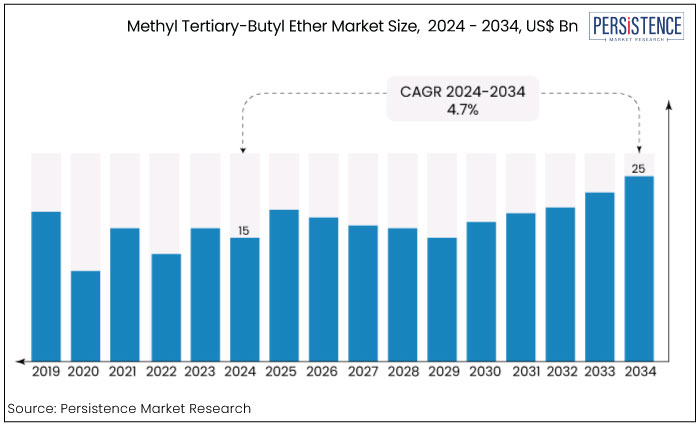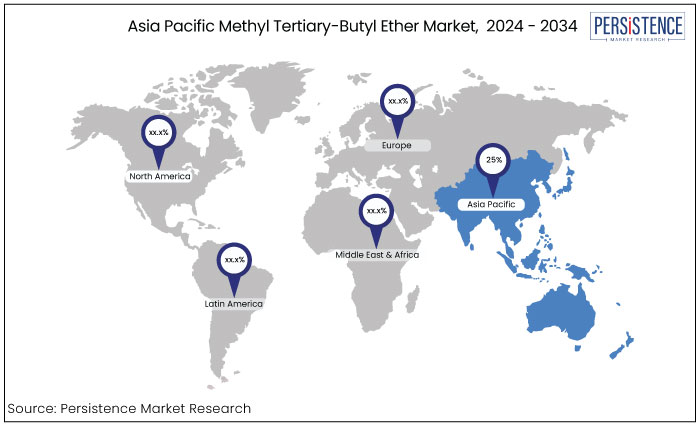ID: PMRREP18952| Upcoming | Format: PDF, Excel, PPT* | Chemicals and Materials

The market is estimated to reach a valuation of US$25 billion by the year 2034, at a CAGR of 4.7%, during the forecast period 2024 to 2034.

Key Highlights of the Market
|
Attributes |
Key Insights |
|
Methyl Tertiary Butyl Ether Market Size (2024) |
US$15 Bn |
|
Methyl Tertiary Butyl Ether Market Size (2034) |
US$25 Bn |
|
Forecast Growth Rate (CAGR 2024 to 2034) |
4.7% |
|
Historical Growth Rate (CAGR 2019 to 2023) |
4.2% |
Methyl tertiary-butyl ether (MTBE), having a molecular formula (CH3)3COCH3, is an organic compound generally produced by the reaction between isobutene and methanol in the presence of a catalyst. It is a flammable, volatile and colorless liquid with a characteristic mild odor.
Distinctive characteristic properties, such as higher octane number, low blending vapor pressure, high miscibility with gasoline, and distillation properties, render it suitable as an oxygenating agent in gasoline fuel.
The use of MTBE as an oxygenate increases the oxygen content of the fuel and ensures complete combustion. Compared to other oxygenates, methyl tertiary butyl ether exhibits relatively lower solubility in water without phase separation, lower blending density, vapor pressure and no corrosion problems.
All these attributes and properties render it advantageous over some of the other agents, leading to the growth of the market.
MTBE is recognized for its function as an octane booster and oxygenate additive in gasoline, which is essential for the reduction of emissions and the improvement of combustion efficiency.
Further, the demand is influenced by the stringent environmental regulations aimed at addressing air pollution, and the increasing use of petroleum in developing countries.
Also, technological innovations play a crucial role to tackle the ecological issues and obstacles from alternative additives like ethanol, which includes the use of bio-based MTBE in solvents and chemical intermediates.
Despite the challenges posed by the transition to electric vehicles, geopolitical factors, and fluctuating crude oil prices, these advancements offer new growth opportunities for methyl tertiary-butyl ether suppliers.
The ethyl tertiary-butyl ether market segment continues to be a crucial component of the energy landscape as the demand for sustainable and environmentally favorable solutions continues to grow.
The global Methyl Tertiary Butyl Ether Market share has shown a vibrant growth trajectory over the historical period from 2019 to 2023, where the market witnessed a growth rate of around 4.2%.
Stringent government regulations in the major developed and developing countries regarding the use of oxygenated compounds in gasoline fuel is one of the major factors for the market's growth over the described historical period 2019 to 2023, which, in turn, resulted in an increase in demand for methyl tertiary butyl ether.
Furthermore, increasing gasoline fuel consumption in marine and in oil & gas sectors is expected to boost the demand for methyl tertiary butyl ether over the forecast period, aiding the growth of the market.
Also, an increasing preference for gasoline fuel exhibiting complete combustion and a corresponding increase in demand for high-octane fuels, accompanied by low exhaust emissions, is another factor that is expected to fuel the growth of coating additives like an anti-knocking agent and cleaning additives, among others.
Increased Demand Owing to Oxygenate Attribute
The increased demand for MTBE due to its role as oxygenate, which enhances the fuel combustion efficiency is a major market driving factor for the methyl tertiary butyl ether market growth.
With the functionality of an oxygenate, methyl tertiary-butyl ether improves the efficiency with which fuel is burned, which in turn leads to an increase in its demand.
Consumers and regulatory agencies are increasingly placing more emphasis on fuel efficiency, which is why the need for MTBE as an oxygenate agent is becoming more prominent.
In several industrial processes, such as chemical synthesis and extraction, is utilized as a solvent, which is one of the factors that contribute to the methyl tertiary butyl ether market demand in the relevant industrial sectors.
One of the factors that is boosting demand for fuels and industrial solvents like MTBE is the growing urbanization and industrialization in major developing countries.
With this, there has been a significant increase in market valuation, owing to the developments in production methods and processes that aim to decrease costs and boost efficiency.
Increased Risk of Ground Water Contamination
Due to the ability to contaminate groundwater, along with the health hazards and environmental impact, there has been strict regulatory scrutiny for MTBE.
This scrutiny has led to restrictions and even prohibitions in certain regions, including the US, Canada, and the European Union, which prioritize bio-based fuel additives over MTBE.
Economic considerations are also not to be disregarded. The fluctuating prices of methanol and isobutylene, which are indispensable to the production of MTBE, present a challenge to its cost-effectiveness.
Further, its volatility has the potential to discourage investment and undermine the overall stability of the MTBE market. Also, the methyl tertiary butyl ether market share is being curbed by the emergence of alternative fuels and additives.
Growing Demand for Clean Burning Fuels
The prospective landscape for Methyl Tertiary Butyl Ether Market manufacturers is intricate and multifaceted. By investing in advanced technologies, diversifying their portfolios, or investigating environment-friendly production methods, MTBE producers must promptly adapt to sustainability trends to mitigate environmental risks.
In regions with rigorous emission regulations, there is a persistent demand for octane enhancements and cleaner-burning fuels.
Manufacturing companies that can capitalize on emerging market opportunities may be well-positioned to do so by utilizing their expertise to develop sustainable, eco-friendly alternatives to MTBE.
Staying ahead of the curve and navigating this evolving landscape will necessitate collaboration with academic institutions, industry partners, and regulatory bodies.
Expansion of Refining Capacity & Fuel Blending
The expansion of oil refining capacities globally supports the growth of the MTBE market. As refineries increase their production volumes to meet rising energy demands, the demand for octane boosters like MTBE is expected to rise correspondingly.
Investments in refinery upgrades and expansions contribute to the market's growth by enhancing MTBE production capabilities., which in turn aids the revenue generation for the global methyl tertiary butyl ether market.
Further, the MTBE is primarily employed as an octane enhancer in gasoline, which helps in improving fuel efficiency and engine performance. The demand for higher-octane gasoline is escalating due to stringent emissions regulations and consumer preferences for more efficient vehicles.
With such demand from the end users, this market trend presents significant growth prospects for MTBE as an essential component in gasoline blending operations globally.
Derivative Grade MTBE Dominant Type
|
Market Segment by Product Type |
Market Value Share 2023 |
|
Derivative Grade |
72% |
Based on product type, the Methyl Tertiary Butyl Ether Market is further sub-segmented into oxygenate and derivative grade MTBE, where the derivative grade category dominates the market share.
Demand in the derivative-grade segment is on the rise due to its adaptability in a multitude of industries. MTBE is a critical component in the synthesis of several chemical compounds, such as polymers, pharmaceuticals, and agrochemicals, and it is a valuable intermediate.
It has become an essential component in numerous manufacturing processes due to its distinctive characteristics, including its high reactivity and the capacity to facilitate specific chemical reactions.
The demand for innovative materials and intermediates, including derivative-grade MTBE, has been driven by the global emphasis on the development of sustainable and eco-friendly products.
MTBE-derived products have been adopted by numerous sectors, including construction, automotive, and packaging, due to their improved performance, durability, and reduced environmental impact.
Sales of derivative-grade MTBE are primarily attributed to the increasing demand for specialized compounds in emerging applications, including nanotechnology and advanced materials.
Reformulated Gasoline to be the Primary Application Segment
|
Market Segment by Application |
Market Value Share 2023 |
|
Reformulated Gasoline |
40% |
Based on application, the MTBE market is further divided into reformulated gasoline, solvents and extraction, where the reformulated gasoline segment dominates the market share with nearly 40% of the total market share.
The addition of MTBE to gasoline has shown to be extremely helpful in the transportation fuel sector due to its capacity to increase the octane rating and decrease the emission of dangerous substances from vehicles driven by gasoline.
MTBE continues to be widely used for gasoline reformulation in many places while encountering regulatory obstacles in certain areas due to environmental issues.
The intense efforts undertaken by global key players to use cleaner fuels and enforce strict emission regulations have resulted in a need for reformulated gasoline mixes in cities dealing with air pollution.
The wide use of MTBE as a gasoline additive can be attributed to its cost-effectiveness and compatibility with existing fuel infrastructure, which has solidified its position as the dominant application in the market.
Asia Pacific Contributes 25% Market Share
|
Region |
Market Value Share 2023 |
|
Asia Pacific |
25% |
The Asia Pacific region is the primary consumer with India, and China being the dominant countries in terms of consumption.
During the forecast period, the Asia Pacific region is expected to dominate the MTBE market, mainly due to the significant usage of MTBE in key economies like India, and China. The dominance of Asia Pacific can be linked to the substantial presence of a high number of cars in these countries.
Due to rising urbanization, economic expansion, and increased disposable incomes, there has been a significant increase in vehicle ownership, including cars, motorcycles, and commercial vehicles.
The increase in the number of vehicles directly leads to a greater need for gasoline, in which MTBE plays a vital role as an additive.
The increased MTBE consumption is further bolstered by government measures focused on promoting the automobile industry and improving transportation infrastructure, as well as the ongoing trend of urbanization.
The economic progress in India, and China, which promotes the growth of industries and trade, highlights the ongoing dependence on gasoline and, as a result, the prevailing dominance of MTBE in the market.

September 2022 -
Reliance Industries Ltd, an industrial giant in India, receive approval from the Expert Appraisal Committee of the Ministry of Environment, Forests and Climate Change for its expansion of Hazira Manufacturing Division in the state of Gujarat.
January 2022 -
LUKOIL, a leading competitor in the industry expanded its business operation by offering a license to Lummus Technology for its new integrated plant for manufacturing MTBE in Russia.
The global methyl tertiary-butyl ether market was valued at US$15 Bn as of 2024.
The Asia Pacific region holds the major market share.
Europe is predicted to exhibit the highest growth rate during the forecast period.
Evonik, Eni S.P., Huntsman International, Sinopec, Shell, and Lyondell Basell are some of the major key companies in the market.
The reformulated gasoline segment owns a dominant share of the market.
|
Attributes |
Details |
|
Forecast Period |
2024 - 2034 |
|
Historical Data Available for |
2019 - 2023 |
|
Market Analysis |
US$ Billion for Value |
|
Key Regions Covered |
|
|
Key Companies Profiled |
|
|
Pricing |
Available upon request |
By Product Type
By Application
By End Use
By Region
Delivery Timelines
For more information on this report and its delivery timelines please get in touch with our sales team.
About Author